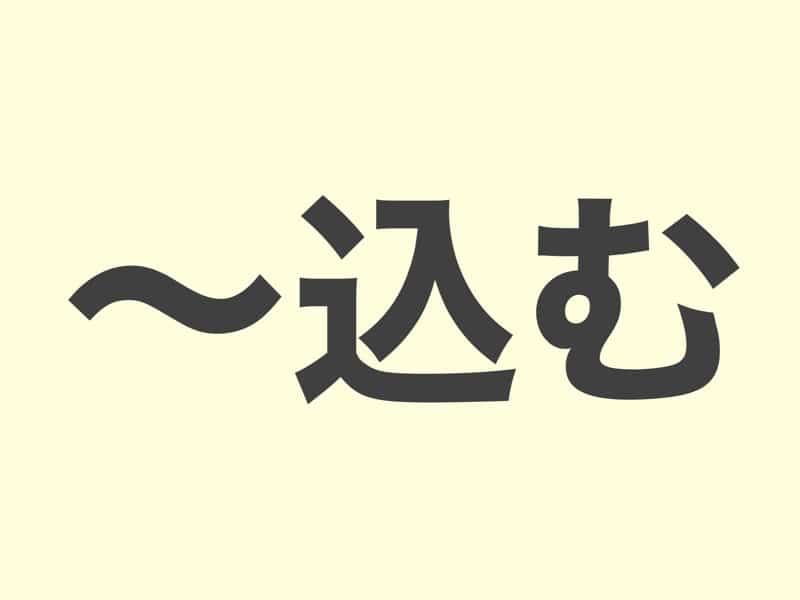In Japanese, there are many verbs that end with the suffix “込む” (こむ), which adds depth and nuance to the action being described. The suffix can convey different meanings, including physical entry into a space, emotional immersion, and prolonged engagement with a subject or situation. Below are some examples of verbs that utilize “込む,” along with their meanings and example sentences to aid in your studies.
JLPT Textbook Recommendations
Entering or Ingressing (Physical “in” meaning)
中に入る、入り込む(物理的な「in」の意味)
飛び込む (とびこむ) – To Jump In
中への動作: 勢いよく中に飛び入る動作を示します。
Entering: This indicates the action of leaping forcefully into something.
- Example: プールに飛び込む。
Translation: “I into the pool.”
引っ込む (ひっこむ) – To Withdraw
外に出ていたものが内側へ引き下がる動作。
Withdraw: This indicates the action of something that was outside pulling back inside.
- Example: 部屋に引っ込んで、ゲームをする。
Translation: “I go to the back of the room to play games..”
運び込む (はこびこむ) – To Bring In
物を中に運ぶ: 外から物を中に運び入れる動作。
Bringing In: This indicates the action of transporting something from outside to inside.
- Example: 新しい家具を家に運び込む。
Translation: “I bring the new furniture into the house.”
突っ込む (つっこむ) – To Thrust In
中に突き入れる: 物や体の一部を中に勢いよく入れる動作。
Inserting: This indicates the action of forcefully putting something or part of the body into another space.
- Example: 手をポケットに突っ込む。
Translation: “I shove my hand into my pocket.” - Example: 財布をバッグに突っ込む。
Translation: “I thrust my wallet into the bag.”
乗り込む (のりこむ) – To Board
中に乗り入れる: 乗り物や場所に入っていく動作。
Boarding: This indicates the action of entering a vehicle or place.
- Example: バスに乗り込むと、すぐに席を見つける。
Translation: “I board the bus and quickly find a seat.”
押し込む (おしこむ) – To Push In
中に押し入れる: 力を加えて中に入れる動作。
Pushing In: This indicates the action of applying force to push something into a space.
- Example: 服をスーツケースに押し込む。
Translation: “I push my clothes into the suitcase.” - Example: たくさんの洋服をタンスに押し込む。
Translation: “I push a lot of clothes into the dresser.”
覗き込む (のぞきこむ) – To Peek Inside
中をじっくり見る: 中の様子を詳しく見るために体を動かして見る動作。
Peeking Inside: This indicates the action of moving to look closely into something.
- Example: 部屋の中を覗き込む。
Translation: “I peek inside the room.”
詰め込む (つめこむ) – To Stuff In
中にたくさん詰める: できるだけ多くのものを中に入れる動作。
Stuffing In: This indicates the action of cramming as many items as possible into a space.
- Example: 荷物を急いで鞄に詰め込む。
Translation: “I hurriedly stuff my luggage into the bag.”
飲み込む (のみこむ) – To Swallow
飲み物や食べ物を口から中に入れる動作。また、理解するという意味も。
Swallowing: This indicates the action of consuming food or drink, as well as understanding something deeply.
- Example: 急いで食べ物を飲み込む。
Translation: “I quickly swallow my food.” - Example: 飲み込みが早い=理解が早い。
Translation: “I understand quickly.”
Deeply Engaging or Long Duration (Emotional/Mental “immersion” or “sustaining” meaning)
深く、長い時間(感情的・精神的な「没入」や「持続」の意味)
考え込む (かんがえこむ) – To Think Deeply
深く考え続ける: 長い時間、物事をじっくり考える状態。
Deeply Contemplating: This indicates a state of thoroughly thinking about something for a long time.
- Example: 問題について長い時間考え込んでいた。
Translation: “I had been thinking deeply about the problem for a long time.”
2. 黙り込む (だまりこむ) – To Fall Silent
長い時間黙る: 長時間、何も話さずに静かにしている状態。
Falling Silent: This indicates a state of remaining quiet without speaking for a long time.
- Example: 突然黙り込んでしまった。
Translation: “I suddenly fell silent.”
3. 話し込む (はなしこむ) – To Talk for a Long Time
長時間話す: 会話が盛り上がり、長い時間話し続ける状態。
Engaging in Conversation: This indicates a state of having an animated conversation that lasts a long time.
- Example: 友達と話し込む。
Translation: “I engage in a long conversation with my friend.”
4. 悩み込む (なやみこむ) – To Worry Deeply
長い時間悩む: 深い悩みについて長い間考え続ける状態。
Worrying Deeply: This indicates a state of continuing to think deeply about a troubling issue for a long time.
- Example: 進路について悩み込む。
Translation: “I worry deeply about my future career path.” - Example: 将来のことで悩み込んでいた。
Translation: “I had been worrying about my future.”
5. 落ち込む (おちこむ) – To Feel Down
気分が沈む: 長い時間、気分が低調になる状態。
Feeling Down: This indicates a state of being in a low mood for an extended period.
- Example: 失敗して落ち込んでいた。
Translation: “I felt down after my failure.”
6. 煮込む (にこむ) – To Simmer
長い時間煮る: 材料を鍋に入れて、長い時間じっくり煮る動作。
Simmering: This indicates the action of slowly cooking ingredients in a pot for a long time.
- Example: スープをじっくり煮込んで、味を染み込ませる。
Translation: “I simmer the soup to let the flavors meld together.”





コメント